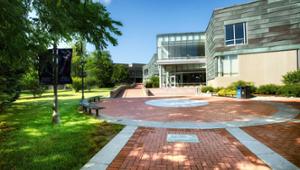
Chinese
The goal of the East Asian Languages and Literatures Department is to introduce students to the region’s changing identity while emphasizing the attainment of language proficiency as well as knowledge of East Asian culture, literature, film, and linguistics.
About the Major
The rapid growth of the Pacific Rim as an economic and technological giant in world affairs has spurred interest in the region's languages and people. Chinese is one of the most widely taught languages in the U.S., essential for politics, diplomacy, business, education, and technology. The Chinese curriculum at �鶹����AV is designed to meet the need for China specialists who are competent in the language and able to study China through original materials. Students hone language skills throughout their four years, and many choose to study in China.
A Sampling of Courses

Americans & Chinese: Case Studies of Cross-Cultural Communication
Through film screening, role-play, skit performances and discussions, students learn to identify differences in the behavioral culture between Americans and Chinese. The course brings students of different cultural backgrounds together and conducts cross-cultural comparison through observation, first-hand experience sharing, and critical analysis. It helps Americans to interact more effectively when dealing with Chinese counterparts in their future careers. It also helps Chinese native speakers to better adjust to the American culture. All course materials are in English or subtitled.
Explore these select courses:
This course is for students with little or no background in Mandarin Chinese. The course covers the first five units of the learning materials, Basic Mandarin Chinese (Speaking & Listening; Reading & Writing). The course will help students develop skills in Mandarin Chinese to conduct basic communication across ethnic, cultural and ideological boundaries and to develop an understanding of Chinese interpersonal behavioral culture. At the end of the course, students will be expected to perform in speaking, listening, reading and writing Chinese at a level of proficiency appropriate for continuing on to the next course in the sequence. Students should also demonstrate a level of cultural understanding suitable for correct performance of assigned tasks in Chinese.
Does Hollywood cinema dictate its reception across the world? Are there clear-cut boundaries between non-Hollywood cinema’s submission and resistance to Hollywood? Facing worldwide competition, how does Hollywood maintain its dominance of global culture? This seminar examines such questions by focusing on the nuanced negotiations between Hollywood films and diverse Chinese-language cultures, including China, Taiwan, and Hong Kong. Students will gain insight into Chinese-language films, literatures, and cultures as well as their own culture shaped by Hollywood-dominated media.
Meet Our Faculty
Junqing (Jessie) Jia
Associate Professor of East Asian Languages and Literatures (Chinese)
East Asian Languages and Literatures, Chinese language pedagogy, psychology of language learning
Tiao-Guan Huang
Visiting Assistant Professor of East Asian Languages and Literatures
Chinese linguistics, teaching Chinese as a second/foreign language, learning and teaching strategies
Chinese cinema and literature
Chinese language and pedagogy, language acquisition
Chinese language and pedagogy, language acquisition
Faces & Spaces
The Kirner-Johnson Building, also known as KJ, houses the offices for faculty members in the East Asian languages and literatures department. The building features an atrium, team rooms for working on group projects, and five case-method classrooms with the latest technology to support teaching and learning.







Careers After �鶹����AV
�鶹����AV graduates who concentrated in Chinese are pursuing careers in a variety of fields, including:
- 5th Grade Science Teacher, Teach for America
- Equity Trader, Goldman Sachs
- Educator, Museum of Chinese in the Americas
- Owner, Council on International Educational Exchange
- Research Technician, Albert Einstein College of Medicine
- Television Reporter and Producer, Thomson Reuters (Beijing)
- Marketing Specialist, GCIS China Strategic Research
- VP Global Education Initiatives, The National Center for Sustainable Development
Explore �鶹����AV Stories
Huang Gives Online Talks at Wenzao Ursuline University
Tiao-Guan Huang, visiting assistant professor of Chinese, was invited by Wenzao Ursuline University of Languages in Taiwan to deliver two lectures in November.

Professors Share ‘Little-Known’ Facts
Is there life on other planets? What does the term ‘Viking’ really mean? Is Earth due for another reversal of the magnetic field? Expert faculty members from several departments, including history, east Asian languages, art history, geosciences, government, and physics, share a little-known fact about their discipline.

Fresh from graduation, Michelle Chung ’20 began an extensive job search and, having previously interned for Penguin Random House, knew that she had an interest in publishing. After identifying an opening with Simon & Schuster, a top publishing company based in New York City, she reached out to Brian Belfiglio ’90.
Contact
Department Name
Chinese Program
Contact Name
Jesse Jia, Program Coordinator
Clinton, NY 13323




